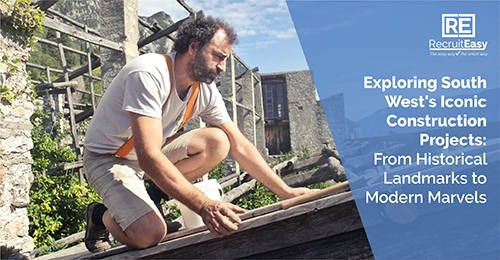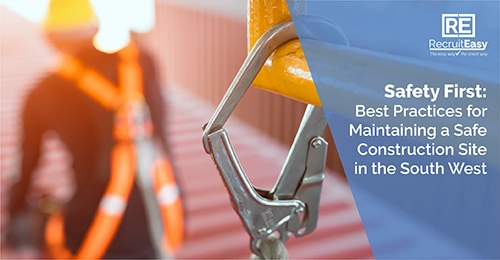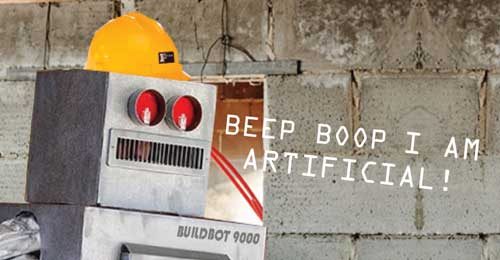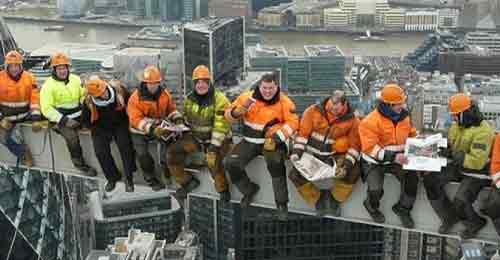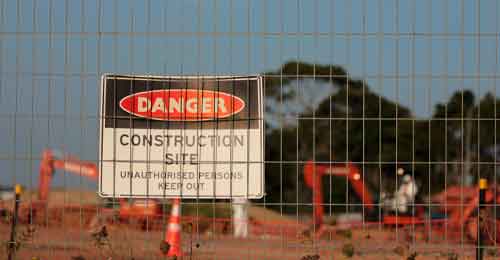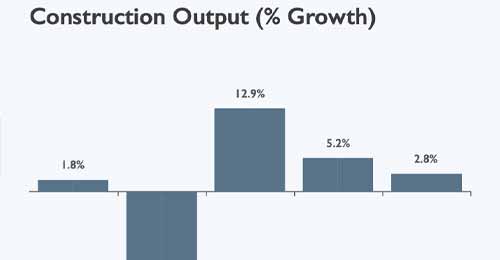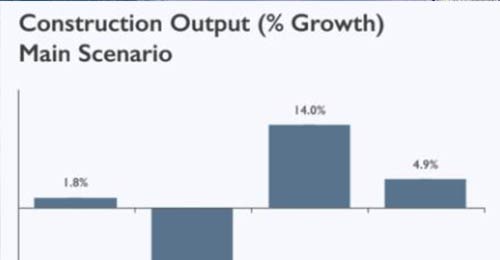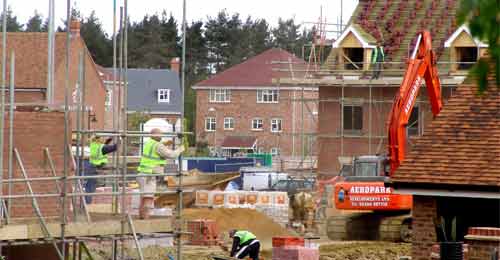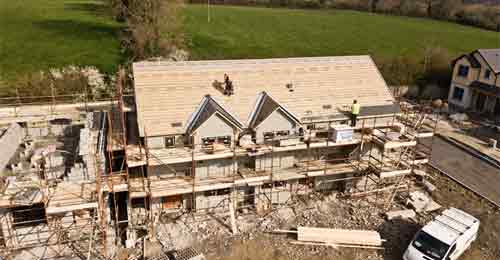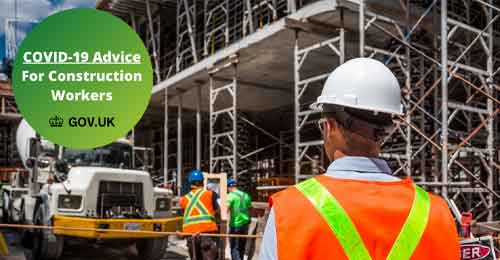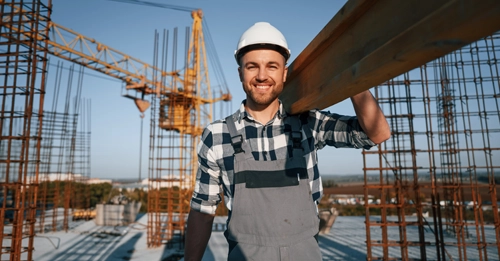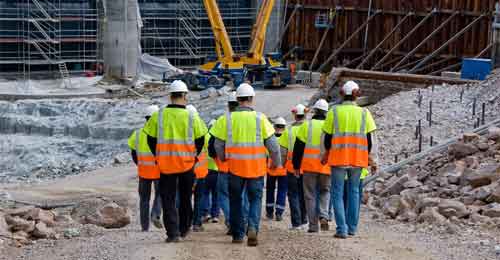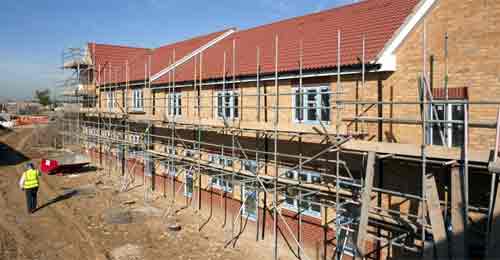Key Highlights
- To increase the number of houses being built, the UK government is taking action.
- With a big gap in skills needed for construction work, finding and hiring people is key.
- New rules and money support from the government are helping out the construction sector a lot.
- People who help companies find workers are coming up with new ways to get enough skilled folks for building homes.
- In making hiring better in construction work, things like online tools and virtual reality are really changing how it's done.
Introduction
The UK government knows we need more houses to keep up with how many people want affordable places to live. Since there aren't enough skilled workers in the construction industry, finding more people to work has become really important. To help out, the government has started a bunch of programs and made new rules that support building more homes. In this blog post, I'll talk about why hiring is so crucial for making houses, what the government is doing to make sure we can build more homes, and how those looking for workers are stepping up their game.
The Role of Recruitment in Boosting UK's House Building Sector
Recruitment is super important for filling the skill gap in the construction industry and helping to increase house building in the UK. The process of recruitment involves finding quality candidates who have the skills needed for different jobs within the construction sector. Experts in construction recruitment know a lot about this field and use their knowledge of different regions to find and bring in the right talent for recruitment needs. By working together with schools and using new ways to recruit, these recruiters aim to get enough skilled workers for house building.
Bridging the Skill Gap in Construction
In the UK, the construction industry is really feeling the pinch because there aren't enough skilled workers around. To tackle this problem, recruitment agencies are teaming up with companies that build stuff to figure out exactly what kinds of skillsets they need. They're not stopping there; they're also giving people chances to learn more and get better at their jobs or even start new careers in building and construction. By working together with schools and setting up apprenticeship programs, these recruiters are doing their bit to make sure the construction sector has a steady flow of folks who know what they're doing, including in cities like Liverpool. This way, we can keep on building without hitting too many bumps along the road.
Meeting the Demand for Skilled Labour
To keep up with the need for skilled workers in house building, recruitment agencies are getting creative and teaming up with schools. They're doing things like:
- Working together with construction companies to get a clear picture of their hiring needs.
- Building solid connections with schools to find and draw in top talent.
- Providing apprenticeships and training opportunities to improve workers' skills while giving them real-world experience.
- Using online platforms and tools for recruitment that make it easier to hire quality candidates.
Government Initiatives to Amplify House Output
In the UK, the government has rolled out several measures to boost house building and help out folks in the construction sector. They've come up with new rules and chances for funding that make it easier for people to start building houses and offer money support for these projects. By teaming up with those who manage construction sites, they're making sure everything goes smoothly and follows the rules. With investments in housing projects and financial perks on offer, their goal is to get more houses built by sparking growth in the construction industry. This way, they hope to keep up with how many people need homes.
New Policies to Support Construction
In the UK, the government has rolled out new rules to help people who build things and make it easier for more homes to be built. They're making it simpler to get plans approved, cutting down on complicated building rules, and pushing for ways of building that are better for our planet. On top of this, they're all about using technology and building parts of houses elsewhere before putting them together at the site. This is part of their plan to make sure there are enough affordable homes around and that the ones we already have are nice places to live in. These steps give companies a clear guide on how they can help meet the country's need for more homes while focusing on areas like digitalization in construction industry practices or sustainable methods within the construction sector across UK
Funding and Investments in Housing Projects
The UK government has allocated significant funding and investments to support housing projects and increase house output in the country. This financial support aims to stimulate the construction industry and provide opportunities for construction companies to undertake new projects. The government provides funding through various channels, including grants, loans, and partnerships with private investors. These investments enable construction companies to develop affordable housing, improve infrastructure, and create sustainable communities. The table below provides an overview of the funding and investments in housing projects:
Funding Source | Purpose |
Government Grants | Financial support for affordable housing projects |
Housing Development Fund | Investments in housing infrastructure |
Private Partnerships | Joint ventures with private investors |
How Recruiters Are Responding to the Call for More Houses
In the construction industry, recruitment consultants are really stepping up to help meet the growing demand for more houses. They're using their deep understanding of the industry, strong connections, and knowledge about different regions to find good people for various construction roles. These recruiters, like ACR, a niche white collar recruitment business, make it a point to work closely with building companies so they can get a clear idea of what kind of workers are needed and come up with solutions that fit just right for their business needs. By keeping themselves in the loop about new ways to recruit people and technology trends, they manage to connect great candidates with suitable jobs. This effort is helping speed up how quickly we can build houses.
Innovative Recruitment Strategies for Construction
Recruitment consultants working in the construction sector are coming up with new ways to find good people for jobs and keep up with the need for skilled workers. Here's what they're doing:
- They're using social media and online job sites to get their messages out there about job openings in construction.
- By getting to know more professionals in the industry, they can discover talented individuals who aren't actively looking for a job.
- They're also looking at data closely to figure out which hiring methods work best.
- And, by teaming up with schools and colleges, they help prepare students for careers in construction while ensuring companies have access to emerging talent.
Through these fresh approaches, recruitment consultants are making it easier for businesses in the building sector to find quality candidates that fit just right. This effort is helping boost how many houses we can build.
Partnering with Educational Institutions
Recruitment consultants focusing on the construction industry are teaming up with schools and universities to tackle the shortage of skilled workers. By working together, they're making sure students know about the opportunities in construction and showing them how to get started in this field. These partnerships help set up apprenticeship programs, internships, and other training efforts that give students real-world experience and valuable knowledge about the industry. Through these collaborations, recruiters can build a steady stream of talent ready to step into roles within the construction sector.
The Impact of Technology on Construction Recruitment
In the construction industry, technology has really changed how hiring is done. Now, with digital tools and online platforms, finding and picking the right people for jobs is faster and works better. Agencies that help companies hire are using these online spaces to look through lots of applicants quickly to spot those who stand out because they're really good at what they do. For teaching new skills or improving old ones in this field, virtual reality is coming into play too. It gives a super realistic way to learn by doing without having to be on an actual site all the time. This whole shift towards tech in recruiting means getting hold of quality candidates quicker than before for both recruitment agencies and businesses within both the construction sector and industry overall; it's making every step from looking for someone to training them much smoother.
Digital Tools for Efficient Hiring
In the construction industry, digital tools and platforms have really changed how hiring is done, making things quicker and better. With these tools, recruiters can easily find, check out, and pick candidates. They often use websites for job postings, systems to keep track of applicants' info, and online interviews to do this. These technologies help them connect with more people looking for jobs while also helping them understand who's best suited for a role based on their skills and experience through data. By using digital methods in recruitment agencies are able to spot top-notch candidates fast which helps build more houses faster in the construction sector.
Virtual Reality in Training and Skill Development
In the construction industry, virtual reality (VR) is making a big difference in how workers learn and develop their skills. With VR, people can dive into a realistic setting where they can practice what they need to do on the job. This comes in really handy for learning how to handle dangerous or complicated tasks safely because you can try things out and make mistakes without any real-world risks. On top of that, since this training can happen remotely, it's easier and more flexible for folks to get the training they need no matter where they are. By using virtual reality in their training programs, companies in the construction field are helping their workforce become more skilled and knowledgeable. This not only makes each worker better at what they do but also helps increase overall house production.
Case Studies: Successful Recruitment Campaigns in Construction
In the construction sector, there have been some really successful recruitment drives as shown by various case studies. These efforts were all about pulling in quality candidates to fill the need for skilled workers. By teaming up with recruitment agencies, companies in this field managed to find and bring on board exactly the kind of talent they needed for their projects, utilizing temporary recruitment strategies to enhance the breadth of their talent networks. Thanks to these effective recruitment tactics, there was a noticeable boost in house building and many construction projects wrapped up successfully. Through these examples, it's clear how crucial good recruitment tactics are and how working closely with recruiting partners can help achieve big goals.
Highlighting Key Success Stories
In the UK, the government's efforts to boost house building are paying off, thanks to some impressive achievements by big names in the construction industry. These successes show that what the government is doing—putting money into projects and making policies—is working well, especially in terms of labour. For instance, Hays has been a key player in finding skilled workers for various construction jobs. With their wide network and good relationships with leading companies in this field, they've made sure there are enough qualified people around. Also, teaming up with firms like Greencore and Gleeds as well as local governments has really helped strengthen things further. These achievements are a testament to the expertise and dedication of industry experts within the construction sector, and highlight the success that can be achieved when companies like Hays work closely with top firms and government agencies.
These great results underline how important it is for different groups to work together if we want to see growth in building more houses. By sharing what they've achieved and learned along the way, these organizations encourage others within both construction sectors of construction industry to follow suit using best practices which leads towards an uptick in housing production across UK, showcasing their solid track record in not just surviving but thriving through collaboration especially when it comes down to effective strategies including efficient recruitment processes.
Lessons Learned and Best Practices
In the world of construction, there are some real success stories that show us how to get more houses built. One big takeaway is how important it is to work well with others in this field. When companies join forces with their clients, suppliers, and everyone else involved, they can really tackle any problem and finish projects successfully.
People who know a lot about construction also tell us we should always be looking for new ways to do things better by using the latest tech and methods that are good for our planet. This approach not only makes building faster but also saves money.
On top of all this, being on top of your game when managing a project from start to finish is key. You've got to have everything planned out clearly – what you're doing, when it's happening, and what you need for it – so everything runs smoothly without any hiccups along the way. Checking in regularly on how things are going helps catch any issues early so they can be fixed right away.
By keeping these points in mind from successful stories within the construction industry, builders everywhere can help meet the growing need for homes across the UK while learning from those who lead by example.
Challenges Facing the Construction Industry Today
In the UK, the construction industry is dealing with a few big problems that are making it hard to build houses as fast as we'd like. For starters, there's not enough skilled workers to go around. More people want their help than there are folks available, which means building projects can't always finish on time, especially when they require skilled labour at short notice. On top of that, getting materials and equipment where they need to be can also get messed up sometimes because of issues with how things are delivered or sent from place to place. To fix these troubles, some smart ideas are needed both for keeping good workers in the job and for smoothing out those bumps in getting supplies where they're supposed to go with minimal fuss.
Addressing the Shortage of Skilled Workers
In the UK, there's a big problem because we don't have enough skilled workers in the construction industry. This is making it hard to build more houses. To fix this, companies and the government need to work on finding more people to join this field and train them well.
To get more people interested in working in construction, we should try a few things. For starters, by showing how great a career in construction can be and reaching out to different kinds of people who might not have thought about it before could help. Also, offering good pay and benefits might attract more folks. By working together with schools and government groups, we can create training programs that teach what's needed for these jobs.
On top of that, putting money into apprenticeships and hands-on learning gives people a chance to learn by doing which helps them pick up skills while they actually contribute towards building homes. If we focus on both bringing new faces into recruitment for the construction industry across UK and teaching them properly through various initiatives , then hopefully our shortage issue will start getting better allowing us meet housing needs faster.
Overcoming Logistical and Supply Chain Issues
When it comes to building more houses in the UK, problems with getting supplies and equipment where they need to go can really slow things down. If materials don't arrive on time at construction sites, projects can get delayed, and costs might go up. To fix these issues, companies have to find better ways to manage their supply chains.
One way is by working closely with suppliers and contractors. This means talking clearly and often throughout the project, keeping an eye on what's in stock, buying stuff efficiently, and having backup plans for when things don't go as expected.
Using tech tools like software for managing construction projects can make a big difference too. These tools help everyone stay updated about how much material is available and how fast work is going.
By tackling these logistical challenges head-on, the construction industry in the UK could become more efficient at building houses.
Future Trends in Construction and Recruitment
In the UK, how we build houses and hire people is changing because of some new trends. Now, making buildings that don't harm the environment as much by using less energy and better materials is becoming more important. Also, when it comes to finding and keeping workers, companies are starting to use tech stuff like data to make smarter choices.
Predictions for the Next Decade
Over the next ten years, we're going to see some big changes in how buildings and houses are made. Here's what's coming up:
- First off, there’s a bigger focus on being kind to our planet. Companies will work harder to make sure that the way they build things saves energy, uses stuff that doesn't harm the environment, and overall is just greener.
- With jobs in building and construction, how people get hired is also changing. Thanks to tech like artificial intelligence (AI) and machines doing tasks automatically (automation), finding really skilled workers will become easier for companies. Plus, with more folks working from home or having flexible schedules, the kinds of jobs available might look different than before.
By keeping an eye on these shifts and always looking for new ways to do things better, those who build can be ready for whatever comes next while making sure we have enough homes for everyone.
Preparing for a Sustainable Building Environment
With the construction industry in the UK working hard to build more houses, it's really important that they keep sustainability at the heart of everything they do. This means thinking about how to be kinder to our planet right from when they start planning and designing buildings.
By choosing materials that are better for the environment, creating designs that don't use as much energy, and using power from renewable sources like wind or solar, builders can make a big difference in reducing harm to our surroundings. On top of this, adding features like systems for collecting rainwater or roofs covered with plants can boost both sustainability and resilience against climate changes.
For all this good stuff to happen though, everyone involved needs to work together well. That includes companies who build things, government bodies who make rules about building standards and regulations focused on being eco-friendly; plus groups dedicated to protecting nature need a say too. By aiming for sustainable development within their projects now,the construction sector is doing its part towards making sure we have a greener future ahead.
Conclusion
To wrap things up, the UK's strategy to ramp up house production is key in meeting people's need for homes and pushing economic progress forward. With smart hiring tactics, money support, and new tech in building work, there's a big chance for growth ahead. By filling in skill shortages, answering the call for workers, and going green with projects, this field can do really well while opening doors for both trained folks and those just starting out. Looking at what lies ahead with trends and hurdles, it’s clear that working together - government bodies joining hands with recruitment agencies and schools - is essential to build a future where construction not only booms but does so sustainably.
Frequently Asked Questions
How can I start a career in construction?
If you're thinking about getting into construction, a good place to start is by looking for jobs that are perfect for beginners or apprenticeships. By taking part in training programs and vocational courses, you can pick up the skills needed for this field.
What are the highest paying jobs in the construction industry?
In the construction industry, there are plenty of job roles that come with a good pay slip. At the top of this list is the project manager role, where you're in charge of looking after and managing building projects. Alongside them, other jobs like being a construction manager, quantity surveyor, and estimator also offer great pay. For these positions, having experience under your belt along with expert knowledge and solid leadership abilities is key.
How does the government plan to increase house output?
The UK government has come up with a strategy to ramp up the production of houses. By putting policies in place, offering financial support, and crafting plans specifically aimed at enhancing building efforts across the country, they're tackling the issue head-on. With these measures, their goal is to cut down on the housing shortage by promoting new home construction along with necessary infrastructure development.
What role do recruiters play in the construction sector?
In the construction sector, recruiters are super important. They're like the bridge that brings together construction companies and people who know how to do the job well. By finding and checking out folks for different kinds of work, they make sure everyone fits just right. With a good understanding of what's needed in building stuff, these recruiters smooth out the process of hiring so that jobs find their perfect matches with ease.
Are there opportunities for non-skilled workers in construction?
In the construction industry, there's room for everyone, even if you don't have any special skills. With so many different jobs to do on a building site, they always need people ready to jump in and help out with whatever needs doing. You don't have to know everything from the start; what really matters is that you're eager to work hard and pick up new things along the way.

























